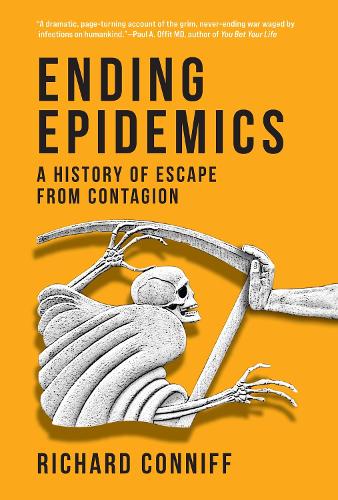
Ending Epidemics: A History of Escape from Contagion
(Paperback)
Available Formats
Publishing Details
Ending Epidemics: A History of Escape from Contagion
By (Author) Richard Conniff
MIT Press Ltd
MIT Press
15th April 2025
26th February 2025
United States
Classifications
General
Non Fiction
614.4
Physical Properties
Paperback
376
Width 152mm, Height 229mm
Description
How scientists saved humanity from the deadliest infectious diseases and what we can do to prepare ourselves for future epidemics. After the unprecedented events of the COVID-19 pandemic, it may be hard to imagine a time not so long ago when deadly diseases were a routine part of life. It is harder still to fathom that the best medical thinking at that time blamed these diseases on noxious miasmas, bodily humors, and divine dyspepsia. This all began to change on a day in April 1676, when a little-known Dutch merchant described bacteria for the first time. Beginning on that day in Delft and ending on the day in 1978 when the smallpox virus claimed its last known victim, Ending Epidemics explains how we came to understand and prevent many of our worst infectious diseases and double average life expectancy. Ending Epidemics tells the story behind the mortality revolution, the dramatic transformation not just in our longevity, but in the character of childhood, family life, and human society. Richard Conniff recounts the moments of inspiration and innovation, decades of dogged persistence, and, of course, periods of terrible suffering that stir individuals, institutions, and governments to act in the name of public health. Stars of medical science feature in this drama, but lesser-known figures also play a critical role. And while the history of germ theory is central to this story, Ending Epidemics also describes the importance of everything from sanitation improvements and the discovery of antibiotics to the development of the microscope and the syringe technologies we now take for granted.
Reviews
"[A] highly readable history of epidemic diseases and vaccinologists, from the first description of bacteria in 1676 to the eradication of smallpox in 1978."
Nature
Conniff gives us the development of immunology and antibiotics famously the work of Louis Pasteur, Alexander Fleming, Robert Koch and Paul Ehrlichin easy-to-swallow chunks.
TLS
Author Bio
Richard Conniff is one of the most talented of the younger generation of American science and natural history writers. His previous books, on insects and invertebrates, have been published in the UK by Souvenir. This is his first book on humans.
